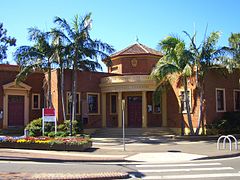Erskineville Town Hall
| Erskineville Town Hall | |
|---|---|

Erskineville Town Hall in 2006.
|
|
| Former names | South Sydney City Council Chambers |
| General information | |
| Type | Government town hall |
| Architectural style | Inter-war Neo-Georgian style. |
| Address | 104 Erskineville Road |
| Town or city | Erskineville, New South Wales |
| Country | Australia |
| Construction started | 1937 |
| Completed | 1938 |
| Client | Erskineville Municipal Council |
| Owner | Sydney City Council (current) |
| Design and construction | |
| Architect | Lindsay Gordon Scott |
| Main contractor | C. Hayter and Son |
The Erskineville Town Hall is a landmark civic building in Erskineville, a suburb of Sydney, Australia. It stands at 104 Erskineville Road. It was opened in 1938 in the Inter-war Georgian revival style by Lindsay Gordon Scott. The Town Hall was the seat of Erskineville Municipal Council from 1938 to 1948 and was the seat of the South Sydney Councils from 1968 to 1982 and 1989 to 2003. Since 2004 the town hall has been a community centre for the City of Sydney servicing the local area.
The original Erskineville Town Hall was built on an adjacent site in the 1880s following the incorporation of the Macdonaldtown Municipal Council in 1872. The original town hall replaced a small building which had been used for meetings since incorporation, described in The Sydney Morning Herald as one the could "scarcely be termed a council-chamber, much less a town hall. An insignificant weatherboard structure, about 50ft by 16ft, containing one apartment only, is all the accommodation possessed. In it the council clerk transacts the ordinary business of the borough, and it also does duty as a council-chamber." The purpose-built Victorian style design Town Hall was designed by architects, Drake and Walcott, who had also designed the Leichhardt Town Hall and were commissioned by the council in March 1889. Built by Thomas Johnson, of Ultimo, the hall was completed in 1890 and the council first met there in February 1890. In 1893, Macdonaldtown was subdivided and the suburb of Erskineville was established, with the name changing to be the "Erskineville Municipal Council".
By the 1930s, with the announcement of the widening and realignment of Erskineville Road, the Victorian-era town hall was set to be demolished. As a consequence, Erskineville Council commissioned plans for a new town hall on a site adjacent to the old hall. In 1936, an initial design by Sydney Architect Lindsay Gordon Scott was accepted. This design was an ambitious one, including two stories and a 75-foot-high clock tower. This design however was found to be too expensive and grand for a small municipality in a primarily working-class area of Sydney and was revised to be the current design of a single storey building without the tower in a similar red brick Georgian revival style. In a tribute to the former council chambers, glass from the original town hall was incorporated into the new offices.
On 1 December 1937, the Mayor of the council, Alderman J. W. Elliott, laid the foundation stone and nearly year later, on 26 November 1938, the Secretary for Public Works and Minister for Local Government, Eric Spooner MLA, officially opened Erskineville Town Hall with the Mayor at that time, Alderman N. McGuinness. However, even this simpler redesign of the town hall found criticism with the Sydney Morning Herald demanding to know how the Council could justify spending £5000 on their "luxurious chamber" when they wouldn’t pay for the immunisation of children against diphtheria.
...
Wikipedia
